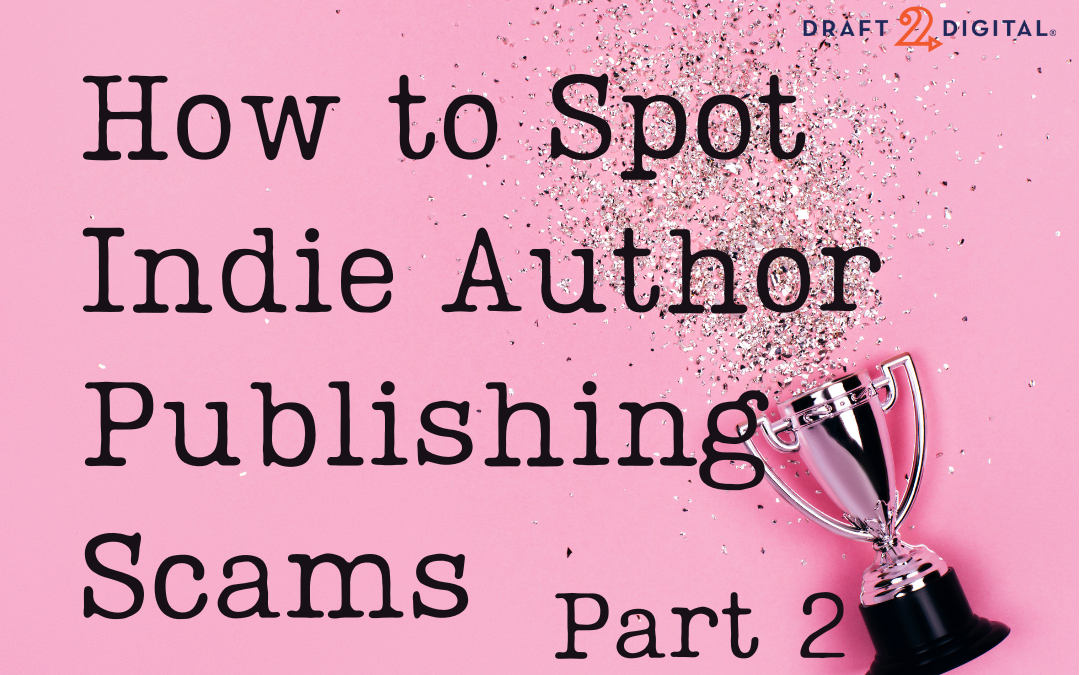Welcome back! Unfortunately, the list of scams designed to snare self-published authors is so long that we had to make this post a two-parter. (If you missed Part 1, check it out here.)
Overpriced services
These can be tricky to spot. Services for self-published authors are often legitimate tools indies can use to put their best literary foot forward. In fact, we highly recommend hiring pros to help with tasks like editing and cover design.
However, bad actors have jumped on this legitimate market, overcharging for underwhelming or nonexistent services. Bogus cover designers are a bit easier to spot due to the highly visible nature of their work, but “invisible” services like editing or coaching are trickier to identify as scams. Do your research before you sign a contract; you may find that the service is at a level you could easily accomplish on your own.
To get a sense of what you should expect to pay, check out Reedsy’s post on the topic. They cover self-publishing costs indies can expect and provide a valuable measuring stick you can use when you’re just starting out. Reedsy is also a great resource for locating legitimate professionals who have already been verified.
How to spot the scam:
- The service is outside the market price
- Reviews or testimonials can’t be verified or don’t exist
- The service portfolio is nonexistent or of poor quality
Copyright registration
Some scammers out there would have you believe that if you don’t register your book’s copyright, anyone could claim your work as their own and profit accordingly. Fortunately for indie authors, intellectual property rights in the U.S. don’t work that way. Authors own the copyright for their work as soon as they create it, regardless of publication status—unless they’ve signed a contract indicating otherwise (as in a ghostwriting scenario).
If you do want to copyright your works to gain some statutory rights, the cost is minimal ($45 at the time of writing).
How to spot the scam:
- Someone contacts you about registering the copyright for your work, claiming it’s necessary. It isn’t.
Bogus marketing services
We all know that marketing matters. It’s also a common pain point for indie authors, who usually get into writing because they want to write books, not sell them. Is it any wonder that scammers have rushed in to fill the void?
These “businesses” will offer to show your book at book fairs, write press releases that “could” get picked up by major news networks, and even sell your book to Hollywood. Sometimes they will offer to advertise your book on their website—which, incidentally, is only visited by other wayward indie authors looking for marketing help.
If you opt to hire a marketing pro, ask fellow authors for referrals or use a platform of vetted professionals like Reedsy’s. Look for someone with experience in marketing self-published books specifically and can show a proven track record. You can even ask for samples of their past work and details about the impact they’ve made on sales.
How to spot the scam:
- Someone asks for a (likely exorbitant) fee to show your book at a book fair
- You’re asked to pay a firm to write a press release about your book
- Someone offers to write “coverage” or an adapted screenplay of your book as though it’s your ticket to Hollywood
Writing contests and awards
Writing contests and awards are another perfectly legitimate path to writerly success … so long as readers have actually heard of them. Some non-competitions are the contest equivalent of a vanity press, with awards you’ve never heard of and prizes that really aren’t.
For instance, you might “win” publication in an anthology that requires you to pay a fee for the privilege. That’s not a prize—it’s an invoice. If the winner receives a trophy but is required to pay for it, that’s another red flag. Legitimate contests should earn you money, not the other way around. And don’t take a real cash prize as an indicator that all is well, either. Some scam contests will ask for an entry fee that nearly matches the small “jackpot.”
As with so many of these scams, Google is your friend here. Do a little digging to make sure a contest is genuine before paying an entry fee.
How to spot the scam:
- You’re told you’ve won a contest—but you have to pay for the prize
- The entry fee for a contest is nearly equal to the amount of the prize money
Final thoughts: do your due diligence
You’d be amazed at how much protection you can gain from a simple Google search. Protect yourself and your work by researching any vendor or individual service provider you’re considering handing your hard-earned money to. If you’re thinking of hiring a company, plug in that company name and the word “scam” into Google and see what comes up. Some of the worst offenders seem to change their names every week, so it can be hard to keep track, but a basic search will go a long way.
If you Google a company’s name and get no results beyond that company’s website and social media, it’s probably a scam. Real businesses—especially the ones that perform well—will be linked from elsewhere, such as the blogs and social media of published authors who have written positive reviews. Of course, not every new business is a scam, but it pays to be extra cautious with any provider who hasn’t built up an online presence yet.
